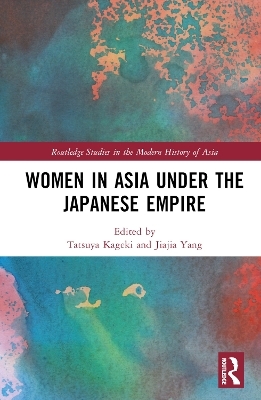
Women in Asia under the Japanese Empire
Routledge (Verlag)
978-1-032-24762-5 (ISBN)
Tackling topics including media, travel, migration, literature, and the perceptions of the empire by the colonized, the authors present an eclectic history, unified by the perspective of gender studies and the spatial and political lens of the Japanese Empire. They look at the lives of women in,Taiwan, Korea, Manchuria, Mainland China, Micronesia, and Okinawa, among others. These women were wives, mothers, writers, migrants, intellectuals and activists, and thus had a very broad range of views and experiences of Imperial Japan. Where women have tended in the past to be studied as objects of the imperial system, the contributors to this book study them as the subject of history, while also providing an outside-in perspective on the Japanese Empire by other Asians.
A vital new perspective for scholars of twentieth-century history of East Asian countries and regions.
Tatsuya Kageki is a research associate in the faculty of economics of Keio University. His research focused on developing the history of social thought in modern Japan and East Asia. Jiajia Yang is an assistant professor in the Research Center for Japanese Language Education and Department of Japanese Language & Literature, College of Foreign Languages and Cultures at Xiamen University. She majors in modern Japanese literature, and comparative literature and culture of Japan and China.
Introduction Part 1. The Ideal of Women Delivered by the Empire 1. The Japanese Women’s Journals in Colonial Taiwan: The Patriotic Taiwan’s Women and Taiwanese Women’s World 2. Expressing independence in the midst of collaboration: Female roles in the women’s magazine Qi Lin of Manchukuo 3. "Wise Wives and Good Mothers": Disobedience in Disguise under the Collaborationist Regime in Guangzhou (1940–1945) Part 2. Women Traveling in and Writing on Asia 4. The West, Asia, and Women in Rha Hye-seok’s Travels 5. A Japanese women’s exploration of semi-colonized China: The case of Hayashi Fumiko 's Traveling writing around 1930 6. Women’s "language/translation" community in Japan/Korea: Hayashi Fumiko as Japanese imperial novelist Part 3. Seeking "Imperial Women" in Colonial Asia 7. Japanese Women in Colonial Taiwan in the 1930s: Their Identity Formation Under the Influence of Japanese Imperialism by analyzing Taiwan Fujinkai 8. An Anarchist Woman’s ideological conversion: How Mochizuki Yuriko Became a Nationalist in Manchuria 9. Statements of "Nanshin Josei" in the 1940s: The Discrepancy between the Representation of "Nanshin Josei" and Their Narratives Part 4. The Periphery of Empire 10. Population Movements of Migrant Okinawan Women during the Development of the Empire: Women’s migration from Okinawa to the South Sea Islands 11. Population Movements of Migrant Okinawan Women during the Collapse of the Empire: Wartime Repatriation and Okinawan Women in the South Sea Islands
| Erscheinungsdatum | 18.01.2023 |
|---|---|
| Reihe/Serie | Routledge Studies in the Modern History of Asia |
| Zusatzinfo | 6 Tables, black and white; 6 Halftones, black and white; 6 Illustrations, black and white |
| Verlagsort | London |
| Sprache | englisch |
| Maße | 156 x 234 mm |
| Gewicht | 600 g |
| Themenwelt | Geschichte ► Allgemeine Geschichte ► Neuzeit (bis 1918) |
| Geschichte ► Allgemeine Geschichte ► 1918 bis 1945 | |
| Geisteswissenschaften ► Geschichte ► Regional- / Ländergeschichte | |
| Geschichte ► Teilgebiete der Geschichte ► Militärgeschichte | |
| Sozialwissenschaften ► Soziologie ► Gender Studies | |
| Sozialwissenschaften ► Soziologie ► Spezielle Soziologien | |
| ISBN-10 | 1-032-24762-2 / 1032247622 |
| ISBN-13 | 978-1-032-24762-5 / 9781032247625 |
| Zustand | Neuware |
| Haben Sie eine Frage zum Produkt? |
aus dem Bereich


